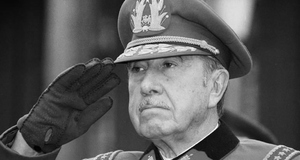From Cornell International Affairs Review VOL. 1 NO. 1A Tale of Two Countries: Lessons from the Latin Quest for the Balance of Equity, Progress, and FreedomSince then, the country has held numerous elections, and the new left of center governing coalition, today led by President Michele Bachelet, has remained committed to free market principles. The economy remains open to foreign trade and investment, and the state deliberately fosters venture capital and new business formation. In the words of Chilean Senator Alejandro Foxley, the Chilean government has been characterized by “a commitment to a permanent budget surplus, and to retiring government debt as an insurance against future financial shocks.“27 Chile and Venezuela represent diametric positions in the range of world governments. Chile has believed that engaging its people in trade with the world develops the poor, and advances society. Venezuela has rejected economic freedom as a solution, and opted instead for dependence on natural resources and government hand-outs. Clearly, the story shows a divide in their policies. So I return to the original question: how do economic freedom, public policy, and institutions correlate with improving the standard of living, prosperity, and progress for all? The results can be shown by a direct statistical comparison. Poverty declined in Chile, from 40% in 1990 to 20% in 2000. In the same period, debt as a percent of GDP dropped from 43% to 13%. Inflation sharply decreased from almost 25% in 1990 to 2.3% near 2000.28 Economic growth averaged 6.1%, the highest and most consistent in Latin America. Income rose an average of 51%, though among the poorest the increase is greater.29 And falling from an average of 15% in the 80s, unemployment reached 7.4% in 1998.30 In Venezuela, President Chavez has enjoyed significantly more oil revenues than the previous three administrations combined.31 It is shocking then, that official statistics report no change in extreme or total poverty and many studies claim that total poverty has actually increased by ten percent.32 In health, the Food and Agriculture Organization of the United Nations (FAO) reports malnourishment in 17% of the Venezuelan population, even though nearly thirty years ago, between 1979 and 1981, only 4% lacked sufficient nutrition. Yet even that statistic disguises the reality in rural areas, such as the states of Amazonas and Apure, where over 2/3 of children are malnourished. Some of Chile’s cities are far more remote, such as Puerto Williams and Punta Arenas near Antarctica, yet Chile consistently meets World Food Summit benchmarks and has reduced malnutrition from 8% in 1990 to less than 4% in 2007. This alone should elucidate the human suffering behind misgovernment.33 An overview of global reports and studies demonstrates a multilateral agreement on their performance.The World Bank’s Doing Business report ranks Venezuela 164th in its analysis of business climates in 175 nations, whereas Chile leads Latin America in 28th place. The World Economic Forum’s 2007 Global Competitiveness report rates Chile the 27th most competitive economy of 125 measured, whereas Venezuela languishes in 88th place. Even less forgiving, the World Competitiveness Center’s 2007 competitiveness ‘scoreboard’ places Venezuela in dead last, 55th of 55 nations studied. Concurring with these studies, the Fraser Institute evaluates Chile as the 20th and Venezuela the 126th of 130 nations in its 2006 study of the Economic Freedom of the World. The countries stand on opposite ends of the spectrum. Corruption indicates the health of society. Finding widespread corruption in businesses, government, and the courts is a sign of a broken social and political system. Transparency International’s 2006 publication of the global Corruption Perceptions Index regards Chile on par with the United States in 20th place, but at 138, Venezuela enters Haiti’s company. When the statistics speak so loudly, covering your ears simply does not work. Corruption to that degree paralyzes society, and those always damaged the most by this injustice are the poor. Chile participated in 8 regional and global educational testing programs from 1995 through 2006; Venezuela only participated once, just prior to Chavez first inauguration, and has not participated since then.34 Homicides in Venezuela tripled in 7 years of Chavez to 13 per 100,000, whereas a recent survey measured homicides in Santiago Chile at 1.4 per 100,000. UNESCO in as 2004 study qualified Venezuela as the most violent country in Latin America.35 What do these statistics mean? How should this history be interpreted? Where is the moral of the story? To me, the essential lesson is not the repudiation of a particular ideology. Leaders come from both the Right and the Left, from both government and the private sector. In Venezuela, Nelson Rockefeller’s visionary IBEC reached out to the poor 63to show them how to better themselves by participating in the market. President Betancourt affirmed Venezuela’s sovereignty and national interests by increasing the government’s share of revenues and by founding OPEC, but he encouraged a private sector which thrived under his policies. The prophetic warning of Arturo Uslar Pietri was nonconformist. He simply feared that dependence on a single natural resource administered by a single organization was an inadequate foundation and a recipe for disaster. And in Chile, I admire visionaries like Jose Piñera and organizations like Fundación Chile. But I also admire, and very much respect, the leadership of many legislators and Presidents of the Chilean Left, in departing from orthodox socialist attitudes toward the free market and the private sector. Instead, they have sought to partner with the private sector to alleviate suffering, raise the standard of living, and bring prosperity and opportunity. Common sense and honesty triumphed. Given fair government, sound policies, and a vision: the poorest man on earth can become the richest; the least, the greatest; the most destitute, the most filled with joy. Such is the power of liberty enthroned in laws, and justice upheld. For the nations of the world, this should be the goal. The potential of the majority of their people lies dormant, until leaders embrace the self-evident truth confirmed by history: Liberty is the cause of Progress. ReferencesBureau of Western Hemisphere Affairs. Background Note: Venezuela. Washington, DC: United States Department of State, 2007. Business Week. “Chile: An Innovative Incubator .” Business Week, October 3, 2005. CNN. “Chavez Takes Control of Oil Giants.” CNN, May 1, 2007. Encyclopaedia Brittanica Online. Encyclopaedia Brittanica, 2007. Energy Information Administration. Crude Oil Price Summary. Washington: United States Energy Information Administration, 2007. Food and Agriculture Organization of the United Nations (FAO). The State of Food Insecurity in the World. Rome: The United Nations, 2006. Foxley, Alejandro. Successes and Failures in Poverty Eradication: Chile. Washington, DC: The World Bank, 2004. Fundación Empresas Polar. La Gran Venezuela. Caracas: Fundación Empresas Polar, 2007. Heritage Foundation/Wall Street Journal. 2007 Index of Economic Freedom. Washington, DC: The Heritage Foundation, 2007. Library of Congress, Federal Research Division. A Country Study: Venezuela (Call number F2308 .W4 1993). Washington, DC: Library of Congress, 1998. MIDEPLAN. La Encuesta de Caracterización Socioeconómica (CASEN). Santiago: Ministerio de Planificación y Cooperación, 2001. Ministerio de Finanzas de Venezuela. Caracas: Ministerio de Finanzas de Venezuela, 2006. Morandé, Felipe G. A Decade of Inflation Targeting in Chile: Developments, Lessons, and Challenges. Santiago: Banco Central de Chile, 2002. Orozco, José. “Chavez, Private Sector Face Off Over Food Shortages in Venezuela .” World Politics Review, March 7, 2007. Ortega, Daniel. Caracas: Institutode de Estudios Superiores de Administración (IESA). Pietri, Arturo Uslar. “Sembrar el Petróleo.” July 14, 1936. Piñera, José. “Retiring in Chile.” The New York Times, December 1, 2004. Pizzolitto, Georgina. Chile. Washington, DC: The World Bank, 2005. Súmate. Venezuela en Cifras Oficiales. Caracas: Súmate, 2006. The Fraser Institute. Economic Freedom of the World. Vancouver, B.C.: The Fraser Institute, 2006. The World Bank. Chile, Poverty and Income Distribution in a High Growth Economy (Report# 22037). Washington, DC: The World Bank, 2001. The World Bank. Doing Business 2007. Washington, DC: World Bank/International Finance Corporation, 2007. The World Bank. Informality: Exit and Exclusion. Washington, DC: The World Bank, 2007. Time Magazine. “Nationalizing Oil, Building Steel.” Time Magazine, March 24, 1975 :2 Transparency International. Transparency International Annual Report 2006. Berlin: Transparency International, 2006. Endnotes
Suggested Reading from Inquiries Journal
Inquiries Journal provides undergraduate and graduate students around the world a platform for the wide dissemination of academic work over a range of core disciplines. Representing the work of students from hundreds of institutions around the globe, Inquiries Journal's large database of academic articles is completely free. Learn more | Blog | Submit Latest in International Affairs |















